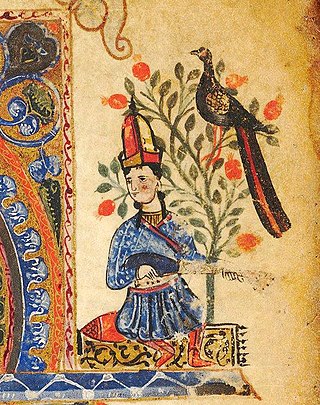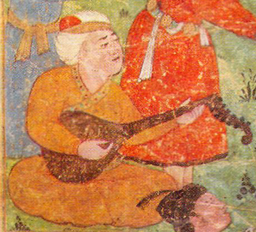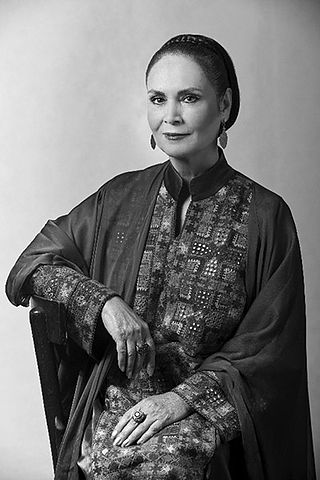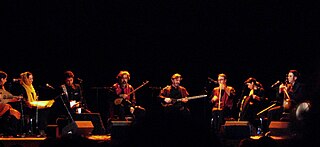Jamshied Sharifi is an American composer, conductor, musician, and record producer. Born in Topeka, Kansas to an Iranian father and an American mother, Sharifi was exposed to music at an early age, learning Jazz and Middle Eastern music through his father and European classical and church music through his mother. He began to study classical piano at age five and quickly developed a thirst for musical instruction and a desire to improvise. At age nine he began studying guitar and drums, and at age ten added flute.

The music of Armenia has its origins in the Armenian highlands, dating back to the 3rd millennium BCE, and is a long-standing musical tradition that encompasses diverse secular and religious, or sacred, music. Folk music was notably collected and transcribed by Komitas Vardapet, a prominent composer and musicologist, in the late nineteenth and early twentieth centuries, who is also considered the founder of the modern Armenian national school of music. Armenian music has been presented internationally by numerous artists, such as composers Aram Khachaturian, Alexander Arutiunian, Arno Babajanian, Haig Gudenian, and Karen Kavaleryan as well as by traditional performers such as duduk player Djivan Gasparyan.
The music of Iran encompasses music that is produced by Iranian artists. In addition to the traditional folk and classical genres, it also includes pop and internationally celebrated styles such as jazz, rock, and hip hop.
Persian traditional music or Iranian traditional music, also known as Persian classical music or Iranian classical music, refers to the classical music of Iran. It consists of characteristics developed through the country's classical, medieval, and contemporary eras. It also influenced areas and regions that are considered part of Greater Iran.

Pejman Akbarzadeh is a Persian-Dutch pianist, journalist, music historian and documentary maker.

Barbad was a Persian musician-poet, music theorist and composer of Sasanian music. He served as chief minstrel-poet under the Shahanshah Khosrow II. A barbat player, he was the most distinguished Persian musician of his time and is regarded among the major figures in the history of Persian music.
Ethno jazz, also known as world jazz, is a subgenre of jazz and world music, developed internationally in the 1950s and '60s and broadly characterized by a combination of traditional jazz and non-Western musical elements. Though occasionally equaled to or considered the successor of world music, an independent meaning of ethno jazz emerged around 1990 through the commercial success of ethnic music via globalization, which especially observed a Western focus on Asian musical interpretations. The origin of ethno jazz has widely been credited to saxophonist John Coltrane.

Ardeshir Kamkar is a Kurdish musician from Iran.

Fātemeh Vā'ezi, better known as Parisā, is a Persian classical singer, Avaz master, and one of the foremost female vocalists from Iran.

Hormoz Farhat was a Persian-American composer and ethnomusicologist who spent much of his career in Dublin, Ireland. An emeritus professor of music, he was a fellow of Trinity College, Dublin. Described by the Irish Times as a "gifted and distinctive composer of contemporary classical music," his compositions include orchestral, concertante, piano and choral music, as well string quartets and chamber works. He also wrote numerous film scores, including that of Dariush Mehrjui's 1969 film The Cow. However, his musicological research dominates his legacy; his writings on the music of Iran—a country which he insisted be called 'Persia'—were pivotal in ethnomusicology, particularly his acclaimed 1990 study The Dastgah Concept in Persian Music.

Farid Zoland is an Afghan songwriter and composer. Throughout his career he has collaborated with many musicians from other countries, most notably from Iran.

Hamāvāyān Ensemble is a Persian music group.
Zohreh Jooya is a singer from Mashhad, Iran.
William James Finegan was an American jazz bandleader, pianist, arranger, and composer. He was an arranger in the Glenn Miller Orchestra in the late 1930s and early 1940s.

Amir Houshang Ostovar was a Persian symphonic music composer and Instructor.

Jalil Shahnaz was a Persian classical music musician and a virtuoso of the Persian musical instrument, tar.
Nagisa or Nakisa was a noted harpist and composer of Sasanian music in the royal court of Khosrow II.
The Shanbehzadeh Ensemble is an Iranian folk band, formed in Bushehr in 1990. The band offers a rare aspect of the traditional music and dance of the Persian Gulf, more specially of the province of Bushehr, south of Iran and bordering Persian gulf.

Ali (Alexander) Rahbari is an Iranian composer and conductor who has worked with more than 120 European orchestras, including the Berlin Philharmonic and the Mariinsky Opera.

Ayuo Takahashi is a Japanese-born American composer, poet, lyricist, singer, and performer of plucked string instruments including guitar, bouzouki, Irish harp, Chinese zheng, Japanese koto, and medieval European psaltery. He is adept at adapting the ancient music of Japan, China, Persia, Greece, and medieval Europe to create a new and original music without abandoning their strict forms while simultaneously making them relevant to contemporary music styles. He has composed for classical ensembles including string quartets, piano, various chamber ensembles, and orchestra, as well as composed, produced and performed with rock, jazz and musicians of various traditional music from around the world. He has also composed many music theater pieces, some of which has been released on CD in the United States and Japan.











